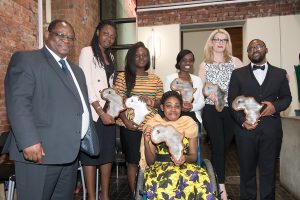The final round of the 25th African Human Rights Moot Court Competition was held at the Constitutional Court of South Africa on Saturday 8 October 2016. The finalist teams consisted of the top Francophone, top Lusophone and two top Anglophone teams who emerged from the preliminary rounds that were held on 3 and 4 October. Appearing for the Applicant team were Stellenbosch University, South Africa and Institute Universitaire d’Abijan, Côte d’Ivoire and arguing for the Respondent team were Makere University, Uganda and the Universidade Eduardo Mondlane, Mozambique. The Stellenbosch team consisted of Mudzuli Rakhivane (LLB final year) and Avuyile Gasela (LLB pre-final year), the team was expertly guided by Prof Annika Rudman.
The bench of judges was composed of Dr Fraida Mamad, a member of the National Human Rights Commission of Mozambique; Advocate Bahame Tom Nyanduga who is the Chairman of the Commission for Human Rights and Good Governance of Tanzania and former member of the African Commission on Human and Peoples’ Rights; Justice Mumba Mila, Judge of the Supreme Court of Zambia and former member of the African Commission on Human and Peoples’ Rights; Justice Raymond Zondo, a judge of the South African Constitutional Court; Advocate Pansy Tlakula, the Chairperson of the African Commission on Human and Peoples’ Rights as well as the Special Rapporteur on Freedom of Expression and Access to Information in Africa and Maitre Armand Tanoh, a legal practitioner in France and former African Human Rights Moot Court Coordinator at the Centre for Human Rights. Justice Raymond Zondo presided.
On both the Applicant and Respondent teams there were four counsels who tackled one issue each. The session lasted for two hours after which a break was taken for the judges to deliberate. It was indeed a battle of the titans. Both teams displayed legal prowess and advanced litigation skills. The judges were so impressed by their extensive knowledge of international law and advocacy skills that Justice Zondo commented that if there had been law firms present, the finalists would have been given instant employment.
The closing ceremony was moderated by Professor Fran Viljoen, the Director of the Centre for Human Rights (CHR). Professor Johann van der Westhuizen, founding Director of the CHR and retired Justice of the Constitutional Court of South Africa, addressed this year’s participants by giving a brief history of the early days of the Centre and how the African Moot Court came into being. In his highly enjoyable and motivational speech, Prof van der Westhuizen emphasized the need to possess the following qualities to become a good lawyer and an active role-player in society: intelligence, hard-working, integrity, independence, good values, Ubuntu, sense of humour, love for one’s country and continent, empowering others through your privilege and the ability to dream.
Professor Viljoen thanked all the participants, faculty representatives, volunteers and judges for their contribution to the success of the 25thAfrican Human Rights Moot Court Competition. He also gave special appreciation to the sponsors of the Moot; the European Union in collaboration with the Global Campus of Human Rights, United States Embassy in South Africa and Norwegian Embassy in South Africa. Prof Viljoen also announced that the 26th African Human Rights Moot would be hosted by the University of Mauritius in 2017.
FINAL ROUND
WINNING TEAM
Combined team of Stellenbosch University, South Africa and Institut Universitaire d’Abidjan, Côte d’Ivoire
RUNNER’S UP
Combined team of Makere University, Uganda and Universidade Eduardo Mondlane, Mozambique
PRELIMINARY ROUNDS [ANGLOPHONE TEAMS]
The top 10 English teams from the preliminary rounds were:
- Stellenbosch University, South Africa
- University of Pretoria, South Africa
- Makerere University, Uganda
- Strathmore University, Kenya
- Moi University, Kenya
- University of Lagos, Nigeria
- Midlands State University, Zimbabwe
- University of the Gambia
- Kabarak University, Kenya
- University of Nairobi, Kenya
Read more on the Competition HERE
[Content of this article (with partial editing) as found on the website of the Centre for Human Rights, UP]

